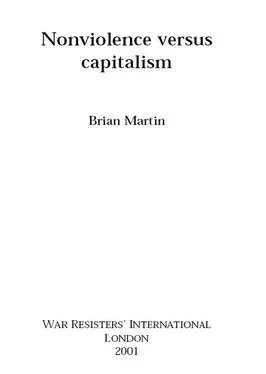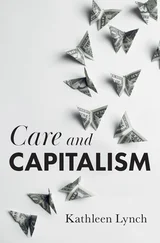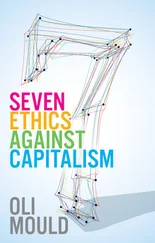Brian Martin
NONVIOLENCE VERSUS CAPITALISM
This book is an outgrowth of an article with the same title published in Gandhi Marg, Vol. 21, No. 3, October-December 1999, pp. 283-312, with revisions, updates and the addition of much new material, especially on strategy (chapters 6 to 12). I thank Mary Cawte, Ellen Elster, David Lewit, Joanne Sheehan, Wendy Varney, Carl Watner and Tom Weber for helpful comments on drafts.
Nonviolent action is the most promising method for moving beyond capitalism to a more humane social and economic system. Approaches based on using state power — including state socialism and socialist electoralism — have been tried and failed. Dramatic changes are definitely needed because capitalism, despite its undoubted strengths, continues to cause enormous suffering. Nonviolent action as an approach has the capacity to transform capitalism, though there are many obstacles involved.
With the collapse of most state socialist systems, there has been since 1990 much triumphal rhetoric about the superiority and inevitability of capitalism. But it is far from an ideal system — very far. It is producing economic inequality on a massive scale, with the poor getting poorer and the rich getting richer. It is destroying traditional cultures, replacing them with a homogeneous consumer culture that lacks authentic community. It is causing enormous environmental damage, undermining biological diversity and depleting resources. It is making the lives of most workers bleak and meaningless, while denying work to those who do not fit the available slots.
But capitalism does produce a massive quantity of goods. It harnesses human acquisitive drives to the task of production unlike any other system. Within market parameters, it provides goods and services in a generally responsive fashion, and has dramatically raised material living standards in many countries. Capitalism does have strengths. Do the weaknesses really matter, if there is no alternative?
Actually, it is absurd to say that capitalism is inevitable. This is really just an excuse for doing nothing to examine and promote improvements and alternatives. The way society is organised is due to the actions of people, and these actions can change. History shows a tremendous range of possibilities for human patterns of interaction. Furthermore, technological development is creating new options for the structuring of work, communication and interaction. Considering that capitalism is only a few hundred years old and continues to change, and that there is nothing approaching agreement that the current system is ideal, the assumption of inevitability is very weak indeed.
Defenders of capitalism assume that there are only two basic options: either capitalism or some sort of system based on authoritarian government, either state socialism or some other sort of dictatorship. (Capitalism is assumed to go hand in hand with representative government, but this ignores those countries with capitalist economies and authoritarian politics, including fascism and military dictatorship.) But of course there are more than these two options. There are other ways of organising economic and social life. The challenge is to figure out which ones are worthwhile and worth pursuing.
Even setting aside options that are completely different, capitalism is by no means a fixed and final system. It will be transformed and will transform itself in coming decades. It could become better or it could become worse, depending on what people do about it.
The two most prominent strategies against capitalism pursued during the 1900s were state socialism and socialist electoralism. Both were attempts to use the power of the state to transform capitalist relations. State socialism — as in the Soviet Union and the People’s Republic of China — relied on capture of state power by a revolutionary party which, in the name of the working class, eliminated private ownership and replaced it by state ownership. In practice the communist party became a new source of rule, in many cases highly repressive.
Socialist electoralism is an attempt to bring about socialism more gradually, gaining state power through the electoral system, increasing the level of state ownership and putting restraints on capitalists. It has been pursued in countries such as Sweden, France and Italy. In practice this strategy has failed by being watered down. Rather than bringing about a transition to socialism, left-wing parties have instead become managers of capitalism, fostering social democracy, in effect an enlightened reform of capitalism. In many cases they have eventually adopted the same policies as their political rivals.
It may seem that capitalism, state socialism and social democracy are very different, but they all rely on the power of the state and hence, ultimately, on violence for control of society. Capitalism relies on state power to protect private property, state socialism relies on state power to run both the economic and political system and social democracy relies on state power to manage the economy. So at a deep level — the level of power for social control, and the ultimate reliance on violence — these three approaches have much in common.
Nonviolent action offers another road, with the potential to be a radical challenge to capitalism without relying on state power. There are hundreds of methods of nonviolent action, including leafletting, strikes, boycotts, marches, sit-ins, refusals to obey and setting up alternative institutions. These methods have been used extensively in all sorts of settings. The most well known are the campaigns for Indian independence led by Gandhi. Here is a list of some of the most often cited highlights of nonviolent action from 1900 onwards.
• Resistance to Russian domination in Finland, 1899-1904.
• Collapse of the Kapp Putsch, a military coup in Germany, 1920.
• German resistance to the French-Belgian occupation of the Ruhr, 1923.
• Gandhi’s campaigns in India, 1920s, 1930s and 1940s.
• Toppling of 10 military dictatorships in South and Central America, 1930s to 1950s.
• Resistance in several European countries to the Nazi occupation, 1940-1945.
• US civil rights movement, 1950s and 1960s.
• Sarvodaya campaigns in India and Sri Lanka, 1950s onwards.
• Collapse of the Algerian Generals’ Revolt, 1961.
• Czechoslovak resistance to the Soviet invasion, 1968.
• The Iranian revolution, 1978-1979.
• Direct action against nuclear power in various countries, 1970s onwards.
• Campaigns against logging, large dams, freeways and on other environmental issues, 1970s onwards.
• People power in the Philippines to bring down the Marcos dictatorship, 1986.
• Palestinian intifada, 1987-1993.
• Prodemocracy movement in China, 1989.
• Collapse of East European regimes, 1989.
• Thwarting of a coup in the Soviet Union, 1991.
• Elimination of apartheid in South Africa, early 1990s.
• Forced resignation of Indonesian President Suharto, 1998.
• Removal of Serbian ruler Milosevich, 2000.
These are all examples of major challenges to aggression, repression and oppression carried out largely or entirely without violence (though of course violence is often used against nonviolent activists). These events include resistance to military invasion, toppling of repressive regimes and challenges to oppressive social systems or hazardous practices. A number of social movements, notably the feminist and environmental movements, have made nonviolent action an integral part of their campaigning.
But what about nonviolent action against capitalism? A look down this list reveals that not a single one of these highly prominent actions is specifically targeted against capitalism.
Читать дальше

![Brian Jacques - Martin the Warrior [Redwall 6]](/books/128385/brian-jacques-martin-the-warrior-redwall-6-thumb.webp)










